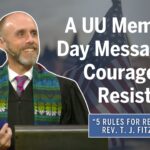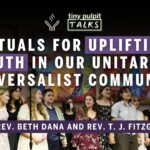Heaven is real. | Faith & Film | Rev. T. J. FitzGerald | 06.23.24

Sermon Transcript
Sing with me now: “Take me out to the ball game. Take me out to the crowd. Buy me some peanuts and crackerjacks. I don’t care if I never get back because it’s root root root for the home team. If they don’t win, it’s a shame for its 1, 2, 3 strikes you’re out at the old ball game.”
Mr. Mays, the old ball game will never be the same. I read a story this week about a man who grew up in a Unitarian Universalist church, not this one. He had the rare and beautiful chance to meet Willie Mays on a flight. He was a black man and he was younger than Mr. Mays. This child of our faith let Mr. Mays know how much he appreciated all he endured and all he did to change so many minds and hearts from the evils of racist thinking and action toward an ethic of equity and community building across difference. This younger man said actually to Mr. Mays, he probably wouldn’t even have his job were it not for all Willie Mays did and how he played the game. For him, it was a dream come true.
This week as we mentioned, we watched Field of Dreams together as part of our Faith and Film series. Just so I can get a sense, how many here have seen the movie? Raise your hands. That was pretty good. I don’t know about the rest of y’all. I don’t know what you’re doing and spending your days. For those who didn’t though I’m pleased to share a synopsis of the story of the movie that I did not write. In his presentation this year at the Academy Awards, comedian John Mulaney was the presenter for Achievement in Sound and here is how he summarized Field of Dreams. I quote,
“Now the Oscar for Achievement in Sound. You know, for years movies didn’t have sound and then they figured it out. Some people say that the silent era was the golden era of film. These people are difficult and insane. Without sound, we wouldn’t have been able to hear such classic lines as you’re going to need a bigger boat or I’ll have what she’s having and he was in the Amazon with my mother when she was researching spiders just before she died or what about that moment in Field of Dreams when we hear “if you build it, he will come” and then Costner does it. He builds a baseball field, I guess he doesn’t build it. He mows corn down and then there’s a field and then he’s like, I’m going to watch ghosts play baseball. And then the bank is like, you want to pay your mortgage? And he’s like, no, I’m going to watch ghosts play baseball. And then he finds James Earl Jones who wrote “The Boat Rocker”, which I thought was a real book deep into my 20s and he’s like, people will come Ray. He’s the only one with a financial plan, but that’s weird. What’s weird is that Timothy Busfield pushes little Gabby Hoffman off the stands and she falls down and she’s unconscious. Then Burt Lancaster is Moonlight Graham and he comes up and he pats her on the back a couple of times and he’s like, hot dog stuck in the throat and he can’t go back to the game because I guess there’s a rule in ghost baseball that if you leave the field at any point you become an elderly ghost and do the Heimlich maneuver, you can’t return to the field. I love Field of Dreams. That should win best picture though they’ll probably go with one of this year’s nominees for Achievement in Sound.”
Yeah, sorry, I didn’t write it. Clap for him. The voice. The voice. Not that voice I promise, no more. The voice that speaks for Ray Kinsella in Field of Dreams is tender and understanding. And the voice that speaks to Job in our reading today is not. I mean, any speech that starts with gird up your loins, it’s going to be a bit of a barn burner. You Bible buffs know it’s not an uncommon phrase in the Bible, actually. In the time when texts like Job were written, the phrase was meant to prepare oneself more mentally than loinly, which is not a word. It’s really the fifth century BC version of you better take a seat or hold onto your hats. And after listening to Job detail every aspect of his abject misery calling and calling on God to help save him, Yahweh, that quirky embodiment of God that liked to appear to humans in forms of destruction and natural weather events had had quite enough of that. And Yahweh let Job have it.
A lot of rhetorical questions, were you there? Were you there when I made all of this, when I made a place for the oceans to be? When I lay the foundations of all existence you’ve ever known and ever will? Yahweh keeps up with the questions until Job finally gets a chance to respond. “Yo man, my bad. I’ll just be over here in my ashes and my filth and dust and I’ll give a lot of thought to what you’ve just said.” My Hebrew isn’t what it used to be, but it’s something like that. But we know what’s really going on. The game was rigged. Yahweh and Satan or Satan, however you want to pronounce it, the adversary in Hebrew, they rigged the game. They caused all of Job’s trouble in the first place. They agreed to take everything Job had, everything he’d ever have, his family, his health, his future only to see if he’d still love God, only to see if he’d curse the name of God.
And what does Job get for this? Gird up your loins. I mean, come on. What do we get, the reader, the audience? We are in on the whole thing. We see what’s going on. Two powerful forces locked in a battle and normal humans and their families bear all of the consequences. It’s an old song and they’re still singing it. We see this going on everywhere around us still to tragic effect. This story, this epic poem really is one of the most influential examples of the tiny glimpse we get of our Creator or our creation, God or our God, whatever you call it. No matter what we see that makes sense this totality of creation, all of it that we can see, everything we can possibly see in our own lives is just a tiny sliver of what’s really going on.
We only have this infinitesimally small part of a world to glimpse in our entire life and still we suffer, right? We call out this tiny world and its maker when the pain of life is so great that it cannot be contained anymore and Lamott shares her pain over the approaching death of her thirteen-year-old cat. I got to tell you, we feel it. Her grandson witnessing his first death and amid the pain she feels, she prays the first prayer any of us ever learn and one maybe all of us could do a little bit better at remembering, “Help. I need help.”
It’s a prayer that went up in the small farming community in Iowa where Ray labored in the fields when he heard the voice. He asked his amazing partner Annie for help. She didn’t know what to do, she just kind of supported him. He asked the kindly people at the farm supply store if they had ever heard voices, and they just started talking about him and saying, “You’re hearing voices.” Then he had a vision of a baseball field in the middle of his corn and started to build that baseball field to bring his vision into being. Now when he got the answer and this help that he asked for, it kind of shook up his town. That’ll happen, the lives of his family. It even shook up the decorum of the meeting that they were holding in the town to ban books. One of my favorite scenes in the movie when Annie Kinsella calls Bula the book banner, a Nazi cow to thunderous applause. But I digress.
You see, sometimes when you take the actions you need to get help, it upsets other people. I’m going to say that again. When you take the actions you need to get help, it might upset other people. And we’re just all going to be okay with that because it upsets the status quo, right? Just ask Willie Mays about that. The calls for help repeat in Ray’s ear though. If you build it, he will come. Ease his pain, go the distance. It’s only in the last scene of the movie when we are told what we probably knew all along. The voice was Ray’s own voice. Maybe his conscience, maybe the better angels of his nature, but it was something inside of him that said to plow under his corn, to build a field, to kidnap James Earl Jones, to pick up a hitchhiker and then mend the relationship with his estranged father over generations of time and space.
All of this happens because of the game. And who’s in that game? Who gets to play in that special field plowed at the behest of raised delusions and risking the welfare of his entire family? We had a discussion about this on Wednesday and not a soul brought this up because Unitarians are too good. The person who, the people who were playing the game are the very crooks that rigged it, right? It’s the Black Sox, it’s the eight men out. I mean, come on. The first people to the field were the eight players who admitted taking money to throw the World Series. The World Series, people. And these players who literally helped rig the game, who played God with fate tell us something with their questions to Ray. What do they ask? Is this heaven? What does Ray say? It’s Iowa. That’s right. Which is funny because if you’re going to cheat at the World Series, you should be in Houston, not Iowa.
I’m going to get letters. That’s right. Boom. Boom. Okay. So much inside baseball. Oh, couldn’t help myself. Oh God, Beth’s groaning at me. But this question, “Is this heaven?” This question is important, friends, to these people, to these crooks, this simple game in this simple tiny place is perfect enough to be mistaken for heaven, which begs the question, what is heaven and who’s going there? Is it a real thing? Our universalist ancestors would say, “Yes, it’s real, and we are all going because that is what Jesus died for.” There are whole theological treatises on that that I could, but that’s the John Mulaney-style answer that I’ve got for you today.
But the great James Baldwin said something, not so shockingly more astute. He said, “The future is like heaven. Everyone exalts it, but no one wants to go there now.” Think about that. He pinpoints one of the problems with the concept of heaven. If it’s so wonderful and perfect, what on earth are we doing, well, on earth? Ideas about heaven and the world beyond vary widely throughout the world, throughout time. They even vary widely within the books contained in the sacred texts of the world’s religions practiced today. They even vary widely in the book some people call the Bible, which is really a library, but that’s another sermon. When we think of angels sitting around playing harps or spending eternity with your entire extended family. Yeah, the words of the longtime minister of my home congregation, All Souls in New York Forest Church comes to mind. He said, “Heaven, as most people talk about it sounds like punishment for good behavior.”
And even the hero of our movie asks his own dad, who appears to him barely more than a boy. Those of you who haven’t seen the movie are probably so confused. That’s all right. But he asks his son or his son asks his dad, “Is there a heaven?” And dad responds rather dramatically, “Oh yeah, it’s where dreams come true.” The crooks who cheated are there. The author who lied about whether he wrote an article, Terrance Mann, he was there. The predatory lenders and brother-in-law, same guy, who watched a child choking to death only to be saved, the scales even fall from their eyes. And in this vision, Ray’s understanding of heaven starts to come into focus. He says, “Maybe this is heaven.” He says this as he sees his family safe at last on the porch and remakes that broken dream of his father by playing a game of catch on that diamond in the corn by playing the game, the beautiful, enduring, totally rigged game.
Many of us believe this life is all there is. It is that urgency that leads so many of us to do the work of equity and justice in this life. I bless that. For others of us, the idea of strumming a harp and having an eternal family reunion actually sounds pretty great. I bless that too. And for still others, the beautiful dreams of physics and energy and hope collide in a sort of nameless reunion of energies that long last or something like that. But we don’t require a belief in any of those things. And we don’t require a rejection of any of those things here. We do not call any of them a heresy. This community holds as sacred your right to believe in the way you believe and to act in accordance with those values. And the power of that freedom can fire real, real change.
When a reporter at the San Francisco Chronicle asked Willie Mays if he’d ever dreamed of playing in the Major Leagues in 1948 when he got his first professional contract in the Negro Leagues, he said, “The majors? I didn’t dream about the impossible.” He went on to say that he worked hard to get into the American Negro League and to play at Rickwood Field where he grew up watching baseball, where just this past week actually what people term the real field of dreams was finally played. It was at that field at 17 years old that Willie Mays helped the Birmingham Black Barons win a championship. And in part, it was that achievement that helped him get signed to the minor league system of the New York Giants at 19 years old. From there, Mays focused on taking each of the steps he had before him, and step by beautiful step became the greatest all-around player in the history of the game.
Ted Williams said it not me, “Help to improve the need for equitable treatment for all persons into the national discourse and national consciousness.” His charisma and excellence did this. His charisma and excellence at the game. And those games that Willie played at the beginning of his career and probably into some of the later years, horrible things were said to him, terrible threats were leveled against him. He had to sleep in different accommodations and hotels than his teammates. And all the while he played the best baseball he could in ways that no other player ever would.
What was it like to see Willie Mays play in his prime, to see the catch, or more importantly, the throw if you know what I’m talking about inside baseball? I wonder if that guy who ran into him on that flight who encountered him, who grew up in a UU church way out west, I wonder if he got to see him play as a kid. I wonder if maybe he saw a game on TV after church while he was living with his grandmother in Honolulu and attending the First Unitarian Church of Honolulu. Of course, back then, this guy who met Willie Mays on a plane went by Barry, at least according to his teacher, Joel. I wonder whether Barack Obama, who heard all that was possible in religious education in one of our churches, friends, could ever have imagined he’d get to meet Willie Mays and thank him for all he did for so many by playing a game, by playing the game.
And I say heaven is real because it’s where dreams come true. And I know there’s a lot on your hearts right now. Forces with the power to affect enormous numbers of people are waging literal wars in the world where the most valuable, the most vulnerable, the most cherished are being harmed. Others are trying to erode the very foundations laid of our civil society and are demeaning people that we love, just to name some of the things on the front page this week.
And it’s not bad advice from Yahweh to gird up your loins for what’s ahead. I get it. And we will do that and we should. But right now together in honor of the 24 that Willie Mays War, I invite all of us into 24 seconds of silence to reflect on what in our own corner of this earth, what under our corner of the sky, what in the next inning of our lives we might do to make this game we play together better and more equitable. Let’s share 24 seconds now.
May all the dreams we just dreamed ever be so, may it ever be so. Bless you all and amen.







